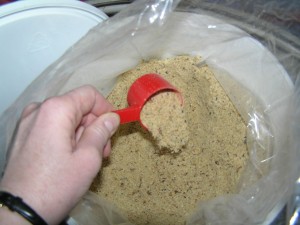Supplement Research by Dr. David Ramey
“It may be that the best supplement is no supplement at all…Avoiding spending money on supplements is particularly appropriate for horse owners struggling to simply maintain their horses in this difficult economy. No benefit is achieved with hypernutrition,” Dr. David Ramey
Our Review of Ramey’s supplement research
By Maddy Butcher
Ah, the wizards of marketing:
They’ve convinced us we should give our kids vitamins. I’m not talking about toddlers and Flintstones. I’m talking about the billion-dollar industry that is horse supplements.
 As horse owners, many of us think we need to add vitamins, minerals, herbs, and chemicals to our horses’ diet.
As horse owners, many of us think we need to add vitamins, minerals, herbs, and chemicals to our horses’ diet.
But Dr. David Ramey says it ain’t so.
He researched supplements and recently presented his findings to the American Association of Equine Practitioners. Read more about it here.
He writes:
“Based on my analysis, if you’re giving your horse enough alfalfa or grass hay so he can keep his weight he’s getting pretty much 100 percent of what he needs.”
Ramey’s only caveat is to offer horses a salt block and consider selenium if you live in areas deficient in that mineral (much of the eastern U.S., for instance). If you think of horses’ Big Picture evolutionarily, Ramey’s conclusion should come as no surprise. For thousands of years, they did just fine without us, without stuff.
Ramey’s second element of his research was to analyze the supplements. He found them woefully lacking. Not only do they lack balance (oversupplying one nutritional need while offering no supply of others), but often the labels misrepresented actual contents.
He calls supplement use a kind of “nutritional roulette.”
Whatever the term, it’s clear you’re not doing your horse any favors and you’re not doing your wallet any favors either.
Good to hear about supplements. I’ve never been “good” with giving a supplement other than having a mineral block and salt block available. I have used hoof supplements that have had positive effects on problematic hoofs. Right now I have a horse that is “poppy and cracky” in his front left leg. He does not seem concerned about it and is good at a walk, trot, canter and full on gallop. I used a supplement for 90 days for joints and the pops never lessened so I stopped. He is an excellent trail horse and companion and the vet is not concerned at all. I was going to try another one over the winter but have decided not to after reading the information on this site. I do feed Purina Strategy, he gets full turn out on 2 acres of grass/weeds (not lush at all) and plenty to keep him at a good weight, coat shiny even when dirty and full mane and tail. Winter months (December-March) he will get supplemental fescue grass hay as ,most of the pasture will be dormant. Still a little green here and there to munch on.
Glad to have bumped in these very beneficial article. I needed the information since I am a new horse owner. Thanks for sharing!